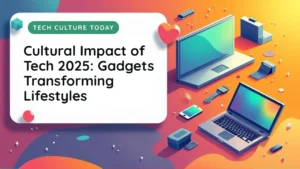The workplace has transformed dramatically in just a decade. What once meant 9-to-5 office cubicles now includes remote work, hybrid models, AI-driven collaboration, and global teams connected through technology. For Gen Z and Millennials, who make up the largest share of the workforce today, these changes are not just adjustments — they’re the new normal.
This generation is redefining productivity, career goals, and work-life balance in ways that will shape the future of work for decades to come. Let’s explore how remote technology and future workplace trends are impacting Gen Z and Millennials.
The Shift from Traditional Offices to Remote Work
- The COVID-19 pandemic accelerated remote work adoption, but Gen Z and Millennials were already pushing for more flexible arrangements.
- Gen Z employees, digital natives born after 1997, see no difference between online and offline collaboration. They value flexibility and expect tech-driven solutions at work.
- Millennials (born 1981–1996), who entered the workforce during tech’s rapid rise, have long embraced virtual meetings, cloud tools, and freelance gigs.
Remote work has become a non-negotiable demand for many in these age groups, with surveys showing that nearly 70% of Gen Z and Millennials prefer hybrid or remote jobs.
Remote Tech: The Backbone of Modern Work
Without the right tools, remote work would collapse. Thankfully, technology has kept teams connected, productive, and innovative.
Key technologies shaping the future:
- Collaboration Platforms: Slack, Microsoft Teams, and Zoom enable real-time communication.
- Cloud Solutions: Google Workspace, Notion, and Dropbox allow easy file sharing and co-editing.
- Project Management Tools: Asana, Trello, and Jira make global teamwork seamless.
- AI Assistants: Tools like ChatGPT and Copilot are automating repetitive tasks, freeing workers for creative work.
- VR/AR Offices: Companies are experimenting with metaverse-style workplaces, where meetings happen in virtual environments.
For Gen Z, who grew up gaming and streaming, these tools feel natural. For Millennials, they’ve been the bridge from traditional work culture to digital-first environments.
Impact on Productivity and Work-Life Balance
- Remote tech has changed how productivity is measured. Instead of hours logged, companies focus on results delivered.
- Gen Z thrives on multi-tasking, often working from coffee shops, co-working spaces, or even while traveling.
- Millennials, who often juggle family and careers, appreciate the flexibility to balance childcare, commuting, and personal goals.
However, the same flexibility can blur boundaries. Many young workers report “Zoom fatigue”, extended work hours, and difficulty disconnecting. This is pushing companies to implement “right to disconnect” policies, ensuring mental health is protected.
The Rise of Freelancing and Gig Economy
Gen Z and Millennials don’t see a career as a single lifelong job. Instead, they embrace multiple income streams and side hustles. Platforms like Upwork, Fiverr, and LinkedIn have made freelancing mainstream.
- For Gen Z, freelancing means creative freedom and global reach.
- For Millennials, it’s a way to diversify income and escape traditional job insecurity.
Remote tech allows workers in India, Nigeria, or Brazil to collaborate with clients in the U.S. or Europe seamlessly. This is creating a borderless workforce.
Skills That Matter in the Remote Era
As tech reshapes work, the most valued skills are evolving.
- Digital literacy: Comfort with AI, cloud platforms, and data tools.
- Adaptability: The ability to pivot careers or roles as industries change.
- Emotional intelligence (EQ): Critical for remote leadership and collaboration.
- Creativity: Automation handles routine tasks, leaving humans to innovate.
- Cybersecurity awareness: Protecting personal and organizational data online.
For Gen Z and Millennials, continuous learning is a necessity, not an option. Online courses and micro-credentials are becoming as important as college degrees.
Challenges Gen Z & Millennials Face
While remote tech offers opportunities, it also brings challenges:
- Isolation: Lack of in-person interaction can hurt creativity and mental health.
- Overwork: The pressure to always be online leads to burnout.
- Job Insecurity: Automation and AI raise fears about job replacement.
- Inequality: Access to fast internet and quality devices is still uneven globally.
Companies need to address these issues if they want to retain young talent.
How Companies Are Adapting
Forward-thinking organizations are reimagining workplaces:
- Hybrid models: Employees split time between office and home.
- Digital-first policies: Documentation, collaboration, and HR processes are fully online.
- Wellness initiatives: Virtual therapy, meditation apps, and flexible hours.
- Diversity hiring: Remote work widens the talent pool beyond metro cities and developed nations.
Firms that adapt are attracting Gen Z and Millennials who prioritize purpose-driven work, inclusivity, and flexibility.
The Role of AI and Automation in Future Work
- AI is no longer science fiction — it’s here, and it’s transforming jobs.
- Millennials use AI to streamline repetitive tasks.
- Gen Z is experimenting with AI to create content, code, and even art.
While some worry about job losses, AI is also creating new roles in data analysis, digital ethics, and AI management. The challenge is reskilling the workforce to stay relevant.
Remote Tech & The Future of Careers
By 2030, experts predict:
- Offices will shrink as remote-first companies dominate.
- Global job marketplaces will allow instant hiring of talent worldwide.
- Metaverse offices may replace Zoom calls.
- AI career assistants will help workers switch jobs or industries seamlessly.
For Gen Z and Millennials, this future offers flexibility, creativity, and global opportunities — but also demands adaptability.
Quick Takeaway
- Remote tech has shifted workplaces to hybrid and digital-first models.
- Gen Z and Millennials demand flexibility, global opportunities, and purpose-driven work.
- AI and automation will create new jobs while eliminating old ones.
- Work-life balance remains a key challenge, requiring new policies and awareness.
- The future of work will be borderless, tech-powered, and innovation-driven.
FAQs – Future of Work & Remote Tech
Q1: Why do Gen Z prefer remote jobs?
Gen Z values flexibility, digital-first tools, and freedom to work from anywhere, which remote tech enables.
Q2: How is AI changing the workplace for Millennials?
AI is automating routine tasks, allowing Millennials to focus on creative and leadership roles.
Q3: Will remote work replace offices completely?
Not entirely. Hybrid models are more likely, with offices serving as collaboration hubs.
Q4: What skills should Gen Z and Millennials focus on?
Digital literacy, adaptability, creativity, and emotional intelligence will be crucial.
Q5: What challenges come with remote tech?
Isolation, overwork, inequality in tech access, and job insecurity are the major concerns.
 Add as a preferred source on Google
Add as a preferred source on Google





